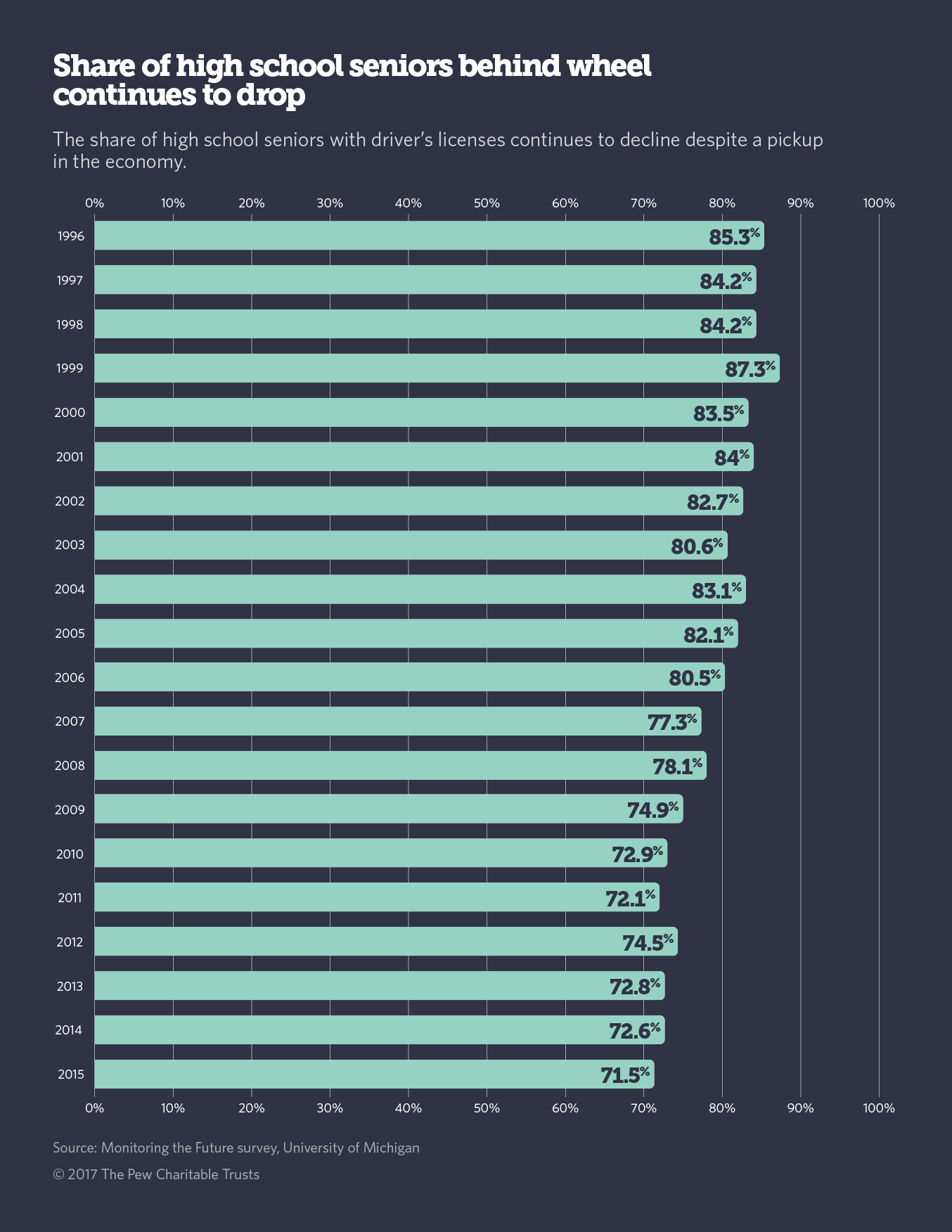Connecting state and local government leaders
Teens are getting driver’s licenses at lower rates than they used to, partly because of licensing restrictions and an explosion of ride-sharing services.
This article was originally published at Stateline, an initiative of The Pew Charitable Trusts, and was written by Tim Henderson.
At 16, Henry Stock doesn’t see many reasons to get a driver’s license.
He can walk to stores near his home in Hollywood, Florida. Many of his friends are fellow gamers he can talk to online. And he can use a mobile ride-sharing app to get a ride when he needs one.
So while Stock has a learner’s permit, he hasn’t yet made much of a dent in the 50 hours of supervised driving he needs to get a full license in Florida.
“It’s more time and effort than I want to put into something that won’t benefit me a lot right now,” Stock said.
Other teens see things the same way. The share of high school seniors across the country who have a driver’s license dropped from 85.3 percent in 1996 to a record low 71.5 percent in 2015, according to data from the University of Michigan’s Monitoring the Future survey.
The drop has been sharpest in the South, where the share of high school seniors with a driver’s license fell from 88.6 percent in 1996 to 71.2 percent in 2015. High school seniors are most likely to have a license in the Midwest — 80.4 percent — and least likely to have one in the Northeast — 64.8 percent.
Part of the reason is economic: fewer jobs, especially during the Great Recession, which meant teens didn’t need to get to work and had less money to bankroll their rides. But even as the economy improved, the share of high school seniors with a license has generally been on the decline. That’s partly a result of tough new rules imposed on young drivers and an explosion in ride-hailing and ride-sharing services.
The shift appears to be having a direct impact on safety.
Drivers aged 16 to 19 are among the most dangerous on the road. They are three times more likely than older drivers to be in a fatal crash. But even as that teenage population has increased from 14.9 million in 1996 to 16.9 million in 2015, the number of drivers in that age group involved in fatal crashes fell by more than half, from 6,021 to 2,898, according to the Insurance Institute for Highway Safety, an industry-funded nonprofit.
Matt Moore, a vice president at the Highway Loss Data Institute, a group affiliated with the insurance institute that analyzes insurance statistics, said so-called graduated licenses such as Florida’s, which require set periods of training and restrict driving privileges at certain ages, have been most responsible for the long-term reduction in the share of teen drivers. “From a safety perspective, that’s a good thing,” Moore said.
But there are signs that the level of fatal accidents involving teens may not stay so low.
The number of 16- to 19-year-old drivers involved in fatal accidents crept up in 2014, from 2,584 to 2,622, and again in 2015, to 2,898, according to statistics compiled by the insurance institute — the first increase since 2002. And the Governors Highway Safety Association noted a 10 percent rise from 2014 to 2015 in the number of 15- to 20-year-old drivers who died in crashes, the first increase for that age group since 2006.
What could be behind the rise? Some traffic safety analysts say licensed teens are driving more as the economy improves and they get jobs. And, they say, more are getting licenses after they turn 18, when most states no longer require training for new drivers.

High Costs
Robert Foss, director of the Center for the Study of Young Drivers at the University of North Carolina, said his state saw a sharp drop in the number of fully licensed 16- and 17-year-old drivers after graduated licensing took effect in 1997.
But when the licensing rate for teenagers continued to drop, Foss said, it was “really almost exclusively about the economy. That had a big effect on teens and their ability to drive and their need to drive.”
A 2012 survey from the AAA Foundation for Traffic Safety found that the most common reason for teens to delay getting a license was not having a car. More than a third cited gasoline and other costs, and many, like Stock, also mentioned the ability to get around without driving.
The recession and its aftermath deprived teens of work opportunities as many older workers were laid off and started to compete for lower-level jobs. The unemployment rate for 16- to 19-year-olds was near 25 percent from 2009 to 2013.
“That means one in four teenagers who wanted a job couldn’t find one,” said Moore of the data institute. “The reality is if you graduated high school at the worst of the recession, you were having a hard time supporting yourself as a teen driver.”
High teen unemployment coincided with some of the biggest drops in license rates for high school seniors, from 82.1 percent in 2005 to 72.1 percent in 2011, Monitoring the Future data show.
Delayed Driving
After a few states experimented with tougher graduated licensing requirements in the early 1990s, by 2006 every state had adopted some form of requirement or restriction. The requirements and restrictions vary. But most states limit driving activity seen as high risk, such as driving at night or driving unsupervised with teen passengers.
The insurance institute set up a calculator to estimate how many fatalities could be prevented by applying some states’ strict driving policies in other states. For instance, if Florida increased its minimum licensing age from 16 to 17 as New Jersey has, the number of fatal crashes would drop by 13 percent and collision claims would drop by 5 percent, according to the calculator.
Some teens are putting off getting licenses until they’re old enough to avoid the graduated licensing process.
Andrew Bennett, a regional coordinator for Nevada’s Zero Teen Fatalities program, knows firsthand how hard it was to get through the state’s graduated licensing program. He waited until he was 18, five years ago, to avoid having to document the time spent driving while his parents supervised him.
“I was heavily involved in sports and band, and it was quite a bit of hassle just to lock down my parents’ time for 50 hours,” Bennett said.
He now volunteers with a high school band in Henderson and sees many students arriving with parents, by bicycle or on public transportation — even though they’re old enough to get a driver’s license. “Some consider it a hassle,” Bennett said. “For others it’s that they can’t afford insurance, so they just wait until they go to college or get a job.”
That teens can wait out the graduated licensing provisions, which generally expire at 18, is a potential safety problem that could undo some of the reductions in fatalities achieved so far, said Ruth Shults, an epidemiologist at the U.S. Centers for Disease Control and Prevention who specializes in preventing motor vehicle crashes.
Once teens or young adults leave the nest, they’ve usually lost the easy ability to get help from parents or older siblings who can introduce them to the rules of the road gradually, she said.
In New Jersey, the law requires new drivers as old as 20 to complete a period of supervised driving. The age requirement was based on a 2008 study that showed that giving older new drivers more experience on the road could help lower crash rates.
That’s one reason the governors’ association recommended last year that states extend graduated licensing requirements to age 21, and require driver education and training for all new drivers regardless of age.
“If you don’t learn to drive when you live at home, your chances of benefiting from the experience of a really expert driver has probably really diminished,” Shults said.

NEXT STORY: Why California Is a Trump Card for Environmentalists



